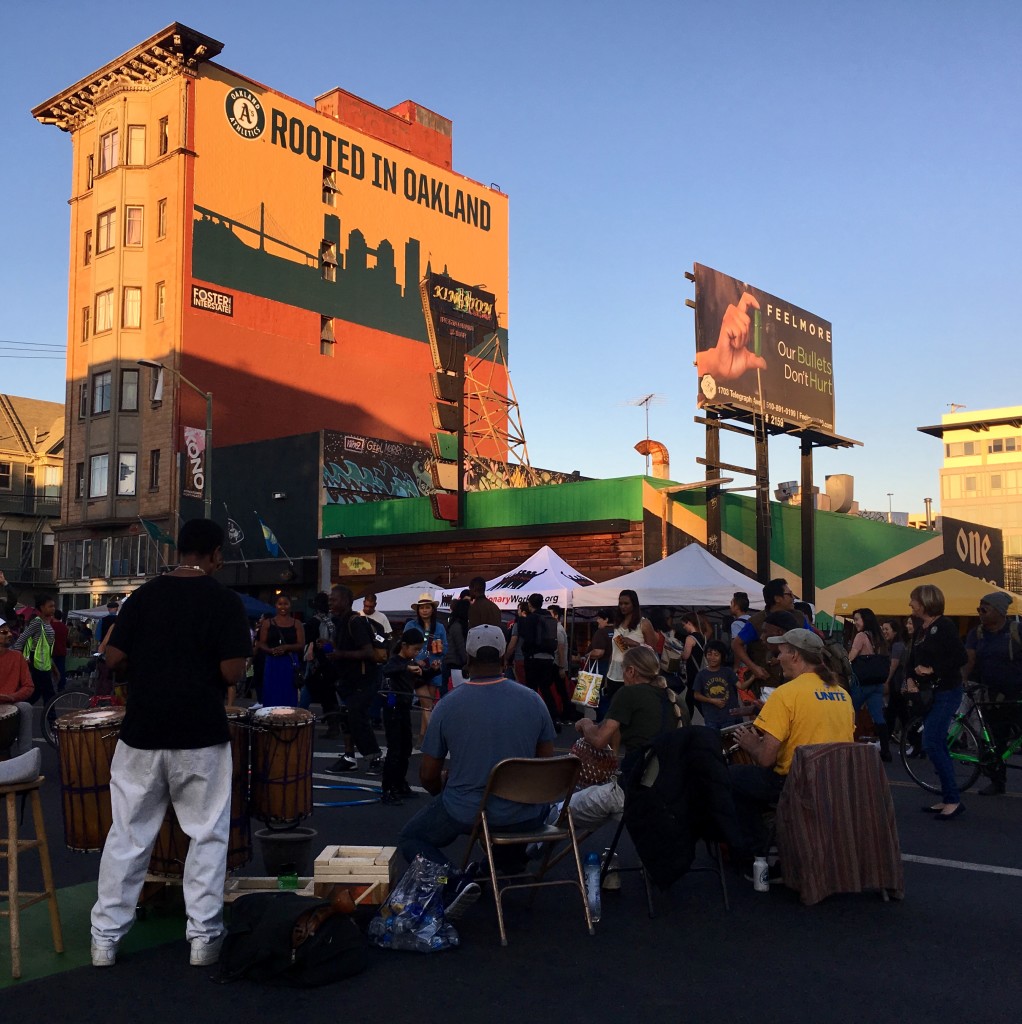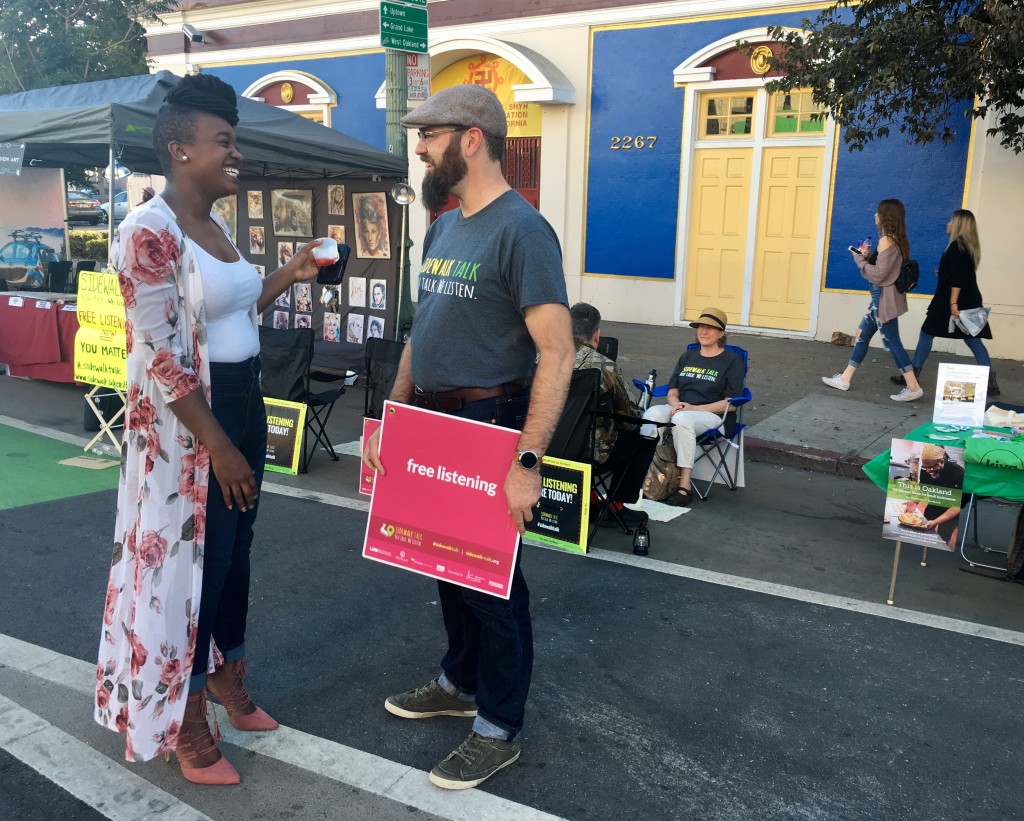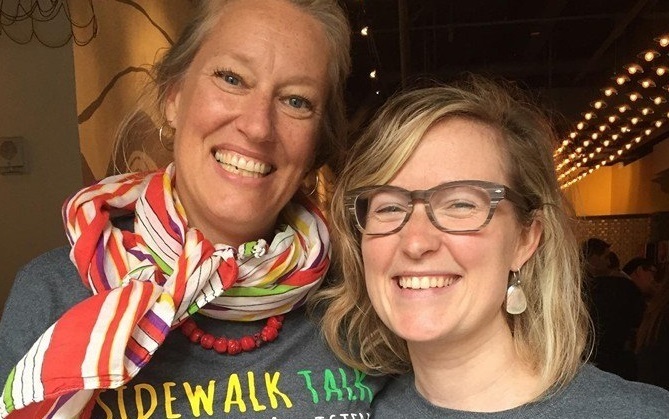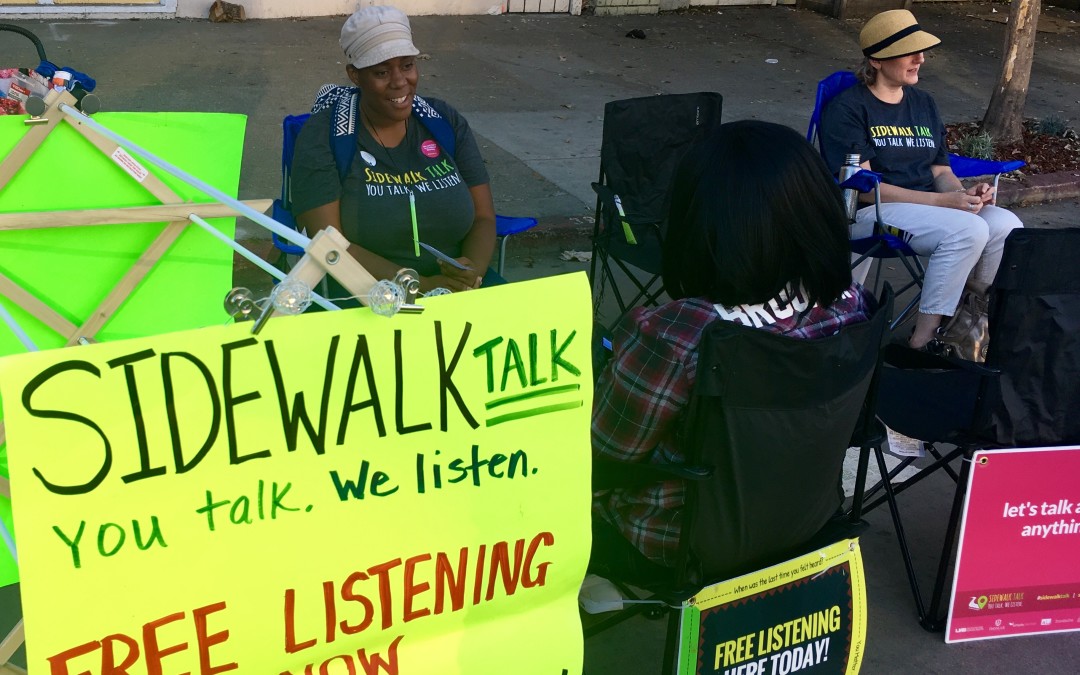Are you being heard? Alison van Diggelen reports for the BBC World Service on a project that offers free listening to people in the street. How is Sidewalk Talk helping to change lives?
“When I first learned of Sidewalk Talk, I was having a depressive episode…I was struggling in my business…online marketing: it’s lonely, it’s isolating and I saw this beautiful project on Facebook and I just lit up! It’s been a year now…I find myself being more articulate, connecting with people, being more compassionate, I’m a better mother, daughter, friend. I’m less reactive…It’s truly been life changing.” Myisha T, Oakland team leader for Sidewalk Talk
Right now, there’s a lot happening to increase our anxiety levels: The mass shooting in Las Vegas; devastating tropical storms, growing terrorism in Europe, Brexit fears…. Plus, the Trump administration seems intent on ratcheting up the conflict with North Korea; clamping down on immigration; and attempting to roll back action on climate change and rights to contraception. Here in Silicon Valley, the California fires on our doorstep are clogging the air with smoke and fear.
With reasons for mental distress growing, support can sometimes seem elusive. In Silicon Valley, there’s a critical shortage of qualified therapists and getting an appointment can take weeks or even months. Calling a helpline might seem daunting – but imagine pulling up a chair on the street where you live and sharing your anxieties with an empathetic listener?
This week, my report aired on the BBC’s Health Check
Listen to the BBC podcast (Sidewalk Talk segment starts at 9:37)
.
Here’s a transcript of the program, featuring a longer version of my report (edited for length and clarity):
BBC Health Check Host, Claudia Hammond: In today’s world, it can sometimes feel difficult to connect with people….Social media means that technically, we’re better connected than ever, but even if we’re surrounded by people – real or virtual – it can feel as if no one is really listening. In Oakland, near San Francisco, a group has come up with a solution, and a low tech one at that. You don’t even have to call a helpline. Instead you see the sign in the street that says “free listening” and you pull up a chair and share your anxieties about the world with an empathetic listener. Alison van Diggelen reports from California on a project that offers free listening.
Atmos: Street sounds at Oakland’s First Friday
Alison van Diggelen: I’m here on Telegraph Avenue in downtown Oakland where Sidewalk Talk volunteers are setting up chairs on the sidewalk. They’re inviting passers-by to take a seat and just talk. The aim is simply to share their story, feel a human connection and perhaps find power in their voice…
Myisha T (Oakland team leader): Hey…free listening…would you like to be listened to today? Come on over, I want to talk to you about something. We’re Sidewalk Talk…we’re a community listening project.

First Friday in downtown Oakland offers an excellent opportunity for Sidewalk Talk volunteers to connect with the community.
Alison van Diggelen: About one in eight of the people she approaches agrees to sit down and talk…Tonight she has two volunteers to help out with deep, active listening.
Myisha, the Beatles sang about “All the lonely people.” Do you see that in the streets here in Oakland?
Myisha T: Yes, absolutely. A lot of people are lonely and when they find out you just want to listen to them are actually shocked. They’re like: wait, what? You really want to connect, no strings attached, no money, it’s not therapy?
There’s a lot of loneliness on the streets, a lot of disconnection..as soon as you sit down…two minutes in you just get connected and you can see the whole body language change, it gets more relaxed…you’ll lean into one another and it’s almost like that loneliness subsides.
Alison van Diggelen: Jessica Anderson, who’s a student advisor at Stanford University, is intrigued and takes a seat opposite a volunteer, Aaron Culich. How does she feel after 10 minutes of talking, with reflective listening by Aaron?

Jessica Anderson talks with Sidewalk Talk volunteer, Aaron Culich on Telegraph Avenue in Oakland.
Jessica Anderson: It added a new color to my happiness. Now there’s the presence of gratefulness. That reflection piece, helping me think about how things are better than I thought they were. There’s more room for introspection and connectedness. Those hormones that go off in your brain when you feel connected? That, that, that’s what just happened. (laughter)
Alison van Diggelen: so you’d recommend this to others?
Jessica Anderson: Yes absolutely…
Alison van Diggelen: About an hour later, I speak with 25 year old Amy Jones (not her real name) who tells me she experienced sexual and physical abuse in her childhood and was suicidal last year. The posters catch her eye, but she doesn’t sit down…
Amy Jones: A year ago, I wasn’t feeling heard and feeling supported by my peers, by my family, by anybody…it’s a really isolating thing and it’s hard to reach out. When there’s an opportunity to just sit down and talk anonymously, it’s a lot less threatening and if I had this a year ago, I probably wouldn’t have considered suicide….
Alison van Diggelen: Amy takes one of Myisha’s fliers and the two women talk intensely for a few minutes…
Amy Jones: I know what it feels like to be in that situation of being unheard…it just kinda builds inside you…you feel like you’re going to be shamed for talking about it. People veer away from it. If you’re happy, people want to be around you. So you put on the face but then you go home and you feel so empty inside. Having an opportunity to get things off of your chest releases that pressure. Because when you don’t, that’s when you explode and that’s when bad things happen…
Alison van Diggelen: Although 50% of volunteers have a background in therapy, Sidewalk Talk is all about deep listening and doesn’t involve therapy or offering solutions. Here’s Myisha:
Myisha T: Sometimes solutions aren’t the solution. Sometimes someone being heard is the solution. Fixing it can stop them finding who they really are.
Alison van Diggelen: So they need to find their own solution?
Myisha T: When you really start to hear yourself, you really do find your own solution. And get your inner conflicts resolved.
Alison van Diggelen: Myisha describes a gay man she listened to here in Oakland. He told her:
Myisha T: Wow, I’ve never had anyone listen to me. I’m always the listener…I’m never sharing how I feel with other people. Just by sitting here and having you listen to me, I hear the power in my own voice…I’m empowered now because I can hear myself…
Alison van Diggelen: Before their conversation he was focused on listening and “fixing” his friends and not asking for the support he needed. SideWalk Talk volunteers find that when people feel heard they move hopelessness to opportunity. It happened to Myisha herself.
Myisha T: When I first learned of Sidewalk Talk, I was having a depressive episode…I was struggling in my business…online marketing it’s lonely, it’s isolating and I saw this beautiful project on FB and I just lit up! It’s been a year now…I find myself being more articulate, connecting with people, being more compassionate, I’m a better mother, daughter, friend. I’m less reactive…It’s truly been life changing…
Alison van Diggelen: Psychotherapist, Traci Ruble feels SideWalk Talk has changed her life too. She launched the nonprofit in 2015 after seeing an uptick in gun violence in the United States …I visited her at her office in Palo Alto.
Traci Ruble: I felt a real pull to want to know what’s happening in our society. I kept having fantasies of putting my psychotherapy chair on the sidewalk as a different kind of protest, to say: what’s going on?
 .
.
.
.
.
.
.
.
.
.
.
.
Traci Ruble (left) was concerned at the uptick in gun violence and fantasized about setting up her therapist chair in the street. She founded Sidewalk Talk in 2015
Alison van Diggelen: Traci persuaded 28 colleagues to set up “listening chairs” all over San Francisco…In almost three years, the project has expanded to 29 cities in 10 countries. Their global team of 1000 listeners has reached over 10,000 people to date and referred over 300 people to low cost or free mental health services. Although she’s convinced it’s making a difference, Traci laments that our so called “social media” can make people even more lonely and deprived.
Ruble Ruble: We need to have a daily dose of face to face human contact. We need this as much as we need air! We need to be touched, hear someone’s tone of voice, see the reflection of their face in their own eyes, and really feel someone. It’s very hard to do in text. We’re not getting the nutrients we need ….
Would a text message be enough to soothe a baby? Would a Facebook post be enough to soothe a baby? We have all those same biological impulses inside of us. We need all that to be well, to be healthy.
Alison van Diggelen: Traci believes that with anxiety levels and disconnection growing, this kind of contact is more important than ever.
Traci Ruble: When you think about mass shootings. I do think when we can de-humanize anybody then that sets us up to be able to engage in aggressive behavior. Everything about SideWalk talk is humanizing ppl again. It’s hard to aggress against humanity when you know that every single person passing you by on the sidewalk has this beautiful, amazing story inside of them.
Fade in atmos of Oakland street scene, drumming…
Alison van Diggelen: Back in Oakland, Amy Jones says she’s serious about volunteering for Sidewalk Talk and Myisha T couldn’t be more delighted. This listening project is incredibly infectious: Those who feel helped are inspired to get involved…
Myisha T: My number one reason for being here is just connecting…genuine human connection.
Fade out: street atmos…drumming….
END
Want to get involved? Find out more about Sidewalk Talk




